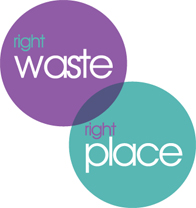


What is my responsibility?
we can help you put the right waste in the right place
What is my responsibility?
we can help you put the right waste in the right place
By using the Simple Guide to Duty of Care and other information contained in this website you can check whether you are already managing your waste in a compliant way and, if not, what changes you need to make to ensure you are in the future.
A good place to start is to determine whether the waste you are producing is hazardous or non-hazardous as both categories need to be handled differently.
On no account should they ever be mixed.
The simple guide to Duty of Care for your Waste and the Need to Know cards should help you decide what you need to do with your waste.
Hazardous Waste
Hazardous waste needs to be handled by a specialist waste company that is licensed to do so. It is your responsibility to ensure this is the case.
Registered to Carry Waste?
You can check whether a company is licensed to handle the type of waste you are producing by visiting the following online registers for England, Scotland, Wales, and Northern Ireland. Please remember you might need more than one specialist waste carrier depending upon the type of waste you are producing and what they are licensed by the environmental regulators to take.
Who has what responsibility for waste?
Essentially there are three links in the chain when it comes to taking responsibility for waste:
1
The waste producer
Most establishments or businesses will fit into this category as they produce waste as a result of their day to day activities.
Every effort should be made to reuse or recycle materials that are no longer needed, but where that is not possible then the waste needs to be recovered or disposed of correctly.
2
The waste carrier
There are a large number of waste carriers in the UK who have responsibility for picking up waste from the producer and transporting it to a site to be recovered or disposed of.
The waste carrier can be the same company as the waste receiver.
3
The waste receiver
These are sites, licensed or permitted by the Environmental Regulators such as the Environment Agency, Natural Resources Wales, Scottish Environment Protection Agency or the Northern Ireland Environment Agency that take the waste from the carrier and either reuse, recycle or dispose of the waste according to regulations and procedures.
–– Each link in the chain needs to reassure itself through evidence that the party they have given their waste to is licensed or permitted for the type of waste produced.
–– Further checks should also be made if there are concerns that the waste is not being handled in accordance with the duty of care.
Illegal depositing
If you suspect that someone is illegally depositing, treating or disposing waste, you should not give your waste to them or take waste from them. You should report suspected illegal activity to your environmental regulator in England, Wales, Scotland or Northern Ireland.
Search our site:

Case Studies
we can help you put the right waste in the right place
Case Studies
we can help you put the right waste in the right place
Many small businesses see waste regulation as more red tape. However your actions can have serious implications for not only your business but the wider community.
Not dealing with your business waste properly could cause injuries, increase fly-tipping and put your livelihood at risk. Here, you can learn from examples. Click on the below right Waste right Place case studies to see how Duty of Care could affect your business. You'll find cases showing the pitfalls to avoid and examples of best practice.
Search our site:
Useful links:




